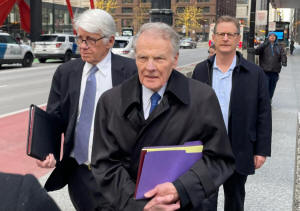Madigan case: Jury to decide fate of alleged 'Grand Masters of
Corruption'
 Send a link to a friend
Send a link to a friend
 [January 30, 2025]
By Jim Talamonti | The Center Square [January 30, 2025]
By Jim Talamonti | The Center Square
(The Center Square) – Jurors started deliberating at the public
corruption trial of former Illinois House Speaker Michael Madigan in
Chicago.
Judge John Robert Blakey handed the case to the jury shortly after 3
p.m. Wednesday at the Everett McKinley Dirksen U.S. Courthouse. The
judge first provided a few final instructions about communications and
asked jurors to choose a foreperson once they were in the jury room. He
also displayed the verdict forms each juror would receive and said the
verdict must be unanimous.
St. Xavier University Professor David Parker said it’s hard to say what
the jury will do.
“That’s why, a lot of times, you come to these settlements. Both sides
say, ‘Let’s negotiate, because juries can be wild cards. Do you really
want to roll the dice here?” Parker told The Center Square.
Madigan is charged with 23 counts of bribery, racketeering and official
misconduct in connection with a scheme prosecutors called “The Madigan
Enterprise.”
Codefendant Michael McClain is charged in 6 of the 23 counts.
Government attorneys made their final rebuttal case Wednesday.
Assistant U.S. Attorney Amar Bhachu called Madigan and McClain “grand
masters of corruption.”
He said the case did not involve “one and done” bribery payments but “a
stream of benefits” to Madigan.

Bhachu displayed a transcript of a conversation between McClain and the
former speaker’s son, Andrew Madigan, from May 23, 2018.
“I just love these people that, they are in a regulatory body, right?
And they’re offended if people ask for favors. Hello?” McClain said.
“The game he’s talking about is pay to play,” Bhachu said.
“If you want your legislation to move, you pay. That is the game,”
Bhachu said.
Bhachu rejected suggestions by defense attorneys that Madigan did not
know what was going on with ghost payments to the speaker’s allies. The
prosecutor reminded the jury that McClain was in Madigan’s inner circle
and the two men were in regular contact with each other.
Another example Bhachu provided was Madigan’s awareness of former
Illinois Senate John Cullerton’s political business. Bhachu asked the
jury if it made sense for Madigan to be aware of what was going on with
Cullerton but not aware of his own business in the 13th Ward.
Saying Madigan lied on the witness stand earlier this month, Bhachu
argued, “His motive to lie (was) to avoid conviction.”
Bhachu said there was a string of lies and omissions during Madigan’s
testimony. He pointed to Madigan’s statement that he was angry to hear
that people were not doing work, to the former speaker minimizing his
relationship with McClain, and to the former speaker’s lack of candor
about the number of people he referred to McClain.
“More than one,” Madigan said during his testimony.
Madigan’s former executive assistant, Mika Baugher, testified last month
that McClain would often wait in a conference room next to the speaker’s
office at the Illinois Capitol. Baugher said other lobbyists did not
wait there.
When asked during testimony earlier this month if McClain had access to
the room, Madigan answered, “As did others.” The ex-speaker suggested
that he didn’t want to exclude people.
Bhachu asked if people were supposed to believe the conference room was
“like a public toilet” where anybody could come in.

Bhachu cited Madigan’s “I don’t have a memory” testimony about Ray
Nice’s payments from ComEd while Madigan had detailed knowledge of
Nice’s other work.
Regarding Madigan ally Victor Reyes’ law firm, Reyes Kurson, Bhachu
pointed to the relationship between Madigan and Reyes and how Reyes
thanked McClain and “our leader,” referring to Madigan, for the firm’s
deal with ComEd.
Bhachu said Madigan’s job and internship recommendations were not based
on integrity or merit.
“They benefit him in his political capacity, in terms of keeping power,”
Bhachu said.
“Is it ordinary course for a politician to decide when to cut off
payments to somebody?” Bhachu asked.
“This is not ordinary lobbying, good will, or favors,” Bhachu said.
Bhachu said McClain didn’t need to build good will after he retired from
lobbying at the end of 2016.
In response to defense arguments that ComEd did not get everything it
wanted in legislation, Bhachu pointed to ComEd executive Scott Vogt’s
testimony that the utility went from the brink of bankruptcy to
“jubilation” after the Energy Infrastructure Modernization Act (EIMA)
passed in 2011 over then-Governor Pat Quinn’s veto with an estimated
$400 million projected value for a four-year period.
Bhachu said ComEd executives hosted a party to celebrate the one-year
anniversary of the Future Energy Jobs Act (FEJA), which passed in 2016.
“Why would you have a one-year anniversary for legislation if it
sucked?” Bhachu asked.
Bhachu said Madigan stopped supporting legislation for ComEd after news
of the government’s investigation became public.
Bhachu likened ComEd’s dealings with Madigan to drivers using a toll
road.
“Payments made to Mike Madigan were a corruption toll, to make sure
legislation got down that road,” Bhachu explained, noting that former
Chicago Alderman and 13th Ward Madigan ally Frank Olivo started getting
payments before the critical 2011 fall veto session when IEMA passed.
[to top of second column]
|

Former Illinois House Speaker Michael Madigan leaves the Everett M.
Dirksen U.S. Courthouse in Chicago on Wednesday, Jan. 3, 2024.
By Brett Rowland | The Center Square

Contradicting McClain attorney Patrick Cotter’s closing arguments,
Bhachu said, “There were no vague expectations.” Bhachu said ComEd
had specific legislation it wanted passed.
Referring to defense attorneys’ assertions that former Chicago
Alderman and cooperating witness Daniel Solis was a stage actor,
Bhachu reminded jurors that Madigan was not acting when he said
things that were recorded by Solis.
“Mr. Madigan is a seasoned politician, a lawyer for decades. He was
not under our control. What he said, what came out of his mouth, was
what he decided to say,” Bhachu said, pointing to Madigan’s
connections between a state board position for Solis and tax
business for Madigan’s private law firm.
“The ties between these things, in many cases, were made by Mr.
Madigan himself,” Bhachu added.
“We didn’t put the words in Mr. Madigan’s mouth,” Bhachu said.
“He chose to say what he said on those recordings.”
Bhachu said Solis’ cooperation with the government was not based
solely on the Madigan case and noted that he also cooperated with
the investigation of a “high-ranking” Chicago official.
Last June, former Chicago Alderman Ed Burke was sentenced to two
years in prison for corruption.
Bhachu reminded jurors of U.S. Representative Nikki Budzinski’s
testimony that J.B. Pritzker considered Madigan’s job
recommendations when he was governor-elect.
State Representative Regan Deering, R-Decatur, noted that Budzinski
was Pritzker’s special assistant during that time.
“It’s pretty powerful being called as a sitting U.S. congresswoman
for a corruption trial, just highlighting her relationship with
Madigan, Governor Pritzker, etc.” Deering said.
The first-year lawmaker said she took note of Budzinski’s statements
on the witness stand.
“To have her say that she was there and she gave serious
consideration to Madigan’s recommendations, it’s just another
example of that kind of inside power club,” Deering told The Center
Square.

Chicago defense attorney Sam Adam Jr. represented former Illinois
Governor Rod Blagojevich in 2010. Adam said people often hope to get
things from elected officials.
“But the politician knows, ‘I can’t say, OK, if you do this for me,
you will get this,” Adam told The Center Square.
Bhachu addressed charges against the defendants related to the
Chicago Chinatown parcel and land transfer legislation in General
Assembly.
Citing testimony by former state Rep. Avery Bourne, R-Morrisonville,
Bhachu noted there was no big change in the bill between the time he
said Madigan held it up and when the legislation passed by a vote of
107-1.
“Mr. Madigan and Mr. McClain are adept at not leaving their
fingerprints at the scene,” Bhachu said.
Bhachu used a stream of profanities when quoting former state Rep.
Eddie Acevedo, D-Chicago, and describing Acevedo’s anger when he
wanted more money from AT&T in exchange for a job which required
little or no work.
“Eddie Acevedo was a mess,” Bhachu said, adding that both Madigan
and McClain knew it.
“The motive is to reward a political ally for his service,” Bhachu
continued.
Reviewing Count 1, “the umbrella count,” for racketeering
conspiracy, Bhachu told jurors to consider the totality of the
defendants’ behavior.
Bhachu said, per the judge’s instructions for Count 1, the
government does not have to prove that any acts were committed at
all, but it must prove that there was an agreement to commit a type
of crime.
Bhachu closed by displaying McClain’s retirement letter to Madigan,
which said Madigan “had his hand on the rudder” of the state.
“That was true,” Bhachu said.
“Mr. Madigan abused the trust of the public,” Bhachu said, adding
that the former speaker “was blinded by profit, power, and his
desire to stay in power.”
“You have the evidence to hold them accountable for that sunken
trust,” Bhachu said.

Prosecutors allege that ComEd and AT&T Illinois gave out no-work or
little-work jobs and contract work to Madigan allies to get
legislation passed that would benefit them in Springfield.
In 2023, McClain and three others were convicted in the related
ComEd Four trial, and ComEd agreed to pay $200 million in fines as
part of a deferred prosecution agreement with prosecutors.
AT&T Illinois agreed to pay $23 million as part of a deferred
prosecution agreement in 2022.
Madigan and McClain are also accused of using Madigan’s public
office to illegally steer business to his private law firm.
Madigan, D-Chicago, served in the Illinois House from 1971 to 2021
and was speaker for all but two years between 1983 and 2021. He
chaired the Democratic Party of Illinois for 23 years. Madigan also
led the 13th Ward Democratic Organization and served as 13th Ward
committeeman.
McClain, D-Quincy, became a lobbyist after serving in the Illinois
House from 1973 to 1982.
All contents © copyright 2025 Associated Press. All rights reserved |